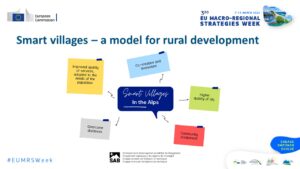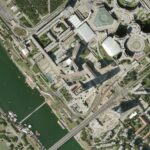Digital transition is one of the main objectives for a sustainable Europe. In doing so, Cohesion Policy in the European Union and beyond needs to take a closer look at how rural communities can catch up. This is when the “Smart Village” approach comes into play.
Against this background, the 3rd EU Macro-Regional Strategies Week hosted the thematic session on “Smart Villages. Smart Solutions for Innovative Rural Communites in Macro-Region” on the 10th of March 2022. Over 70 participants from four macro-regions and representatives from the European Commission attended the meeting. Together we aimed at elaborating on the following questions:
- What are we talking about when we talk about “Smart Villages”?
- What is the state of play in the Alpine Region, Danube Region, and Baltic Sea Region?
- How should cross-macro-regional collaboration on Smart Villages look like?
Thereby, the session seeked to setting the scene for the future cooperation between macro-regions to boost Smart Villages across Europe.
Smart Villages: What is it?
Thomas Egger, leader of Action Group 5 “Connectivity and Accessibility” in the Alpine Strategy, opened the session with a  definition of the “Smart Village” approach. Drawing from the experience of the “SmartVillage” project funded by Interreg Alpine Space, he stressed the importance of user-centricity. Hence, implementing Smart Village initiatives must be accompanied by participatory governance. Likewise, the inclusive approach needs a “critical mass” of citizens that engage in the decision-making process. The “Smart Village” project created a self-assessment tool that helps villages to assess their level of “smartness”. In the next step, key stakeholders discuss with the local population needs and the state of play. After achieving more clarity of the challenges and scale of a potential solution, the stakeholders can apply and adapt proven solutions or develop new ones. These so-called “local heros” then exchanged their experiences on a digital platform to share their knowledge across the Alpine Region.
definition of the “Smart Village” approach. Drawing from the experience of the “SmartVillage” project funded by Interreg Alpine Space, he stressed the importance of user-centricity. Hence, implementing Smart Village initiatives must be accompanied by participatory governance. Likewise, the inclusive approach needs a “critical mass” of citizens that engage in the decision-making process. The “Smart Village” project created a self-assessment tool that helps villages to assess their level of “smartness”. In the next step, key stakeholders discuss with the local population needs and the state of play. After achieving more clarity of the challenges and scale of a potential solution, the stakeholders can apply and adapt proven solutions or develop new ones. These so-called “local heros” then exchanged their experiences on a digital platform to share their knowledge across the Alpine Region.
In addition, the project aimed at enhancing the advocacy for smart village initiatives among politiciancs in order to gain more support for municipalities.
Has the Smart Village arrived in the macro-regions?
Representatives from the Alpine Region, Danube Region and Baltic Sea Region talked about their experience and provided a general picture about how far advanced the concept is. While the Alpine Region is well advanced in promoting the approach at both municipalities and politicians at the national level, the Danube Region and Baltic Sea Region displayed different developments.
Katja Vonhoff from Diakonie Baden and lead partner in the Interreg project D-CARE Labs explained how the use of Information and Communication Technologies (ICT) could solve challenges regarding social service provision in rural communities in the Danube Region. Particularly, in the area of elderly care of services for disabled people, the mere up-skilling of users will not lead to satisfactory outcomes. Hence, the involvement of citizens is pivotal. In doing so, the general usability and accessibility of services improves for everyone. Unfortunately, many rural communities in the Danube Region face major short-comings concerning the basic development of infrastructure. Therefore, the Smart Village approach requires investments in digitalisation first.
Additonally, the cooperation in the D-CARE Lab project revealed that some elderly people in the Western Balkans turned out to be highly skilled in the use of ICT. The major brain drain in rural areas in the Western Balkans caused elderly people to use communication technologies to keep in touch with their families. Therefore, they appeared to suffer less from a feeling of isolation during the COVID pandemic. This is also a valuable learning for future Smart Village initiatives.
Esa Kokkonen, coordinator of the Policy Area “Innovation” in the Baltic Sea Strategy pointed to yet another development. Contrary to the Danube Region, the digtal infrastructure in the Baltic Sea Region is rather advanced. At the same time, there are also large rural areas that face various challenges. Yet, the strategic focus has not put digitalisation and rural communities in the centre of attention. While the rapid growth of cities promoted the implementation of smart city models, smart concepts are hardly on the agenda of rural communities (with some exceptions).
However, this focus somewhat shifted during the pandemic. People appreciated less densely populated areas and living in the green. Home office models proved that remote working is possible. Likewise, smart cities acknowledged that their “smartness” reaches a limit when surrounded by rural communities that have not embraced smart solutions. So advocating for smart municipalities also means to improve the link between smart urban areas and their (smart) peripheries. Hence, the Baltic Sea Region needs to find ways to transfer its achievements in the field of smart specialisation to rural communities.
Smart Villages across Europe
Rural communities across Europe face similar challenges such as brain drain, connectivity, climate change, social inclusion etc. At the same time, the assessment from the macro-regions showed different starting points for the implementation of Smart Village initiatives. In the panel discussion, Thomas Egger, Katja Vonhoff, and Esa Kokkonen discussed why stakeholders in the different macro-regions would benefit from cross-macro-regional cooperation. Together with the participants, the speakers shared their views on the most important aspects of European cooperation. Thereby, the participants and speakers concluded alike: Despite the different starting points, all macro-regions would benefit from two main activities – which are mutual learning and policy advocacy.
These activities will also be addressed in the future cooperation across macro-regional strategies on Smart Villages. Peter Niederer from the Swiss Association for Mountain Regions presented the project SMART ERA that addresses interregional cooperation and exchange to promote the Smart Village approach. Part of the project is setting up a cross-macro-regional collaboration network to anchor Smart Villages in national and regional policies as well as enhance knowledge and expertise across Europe.
Links




